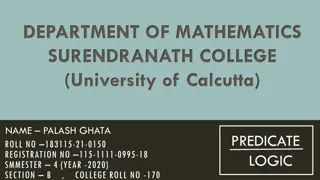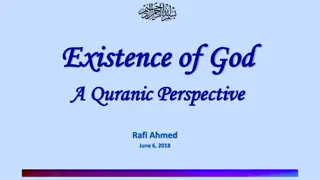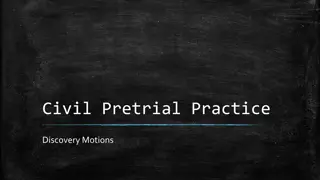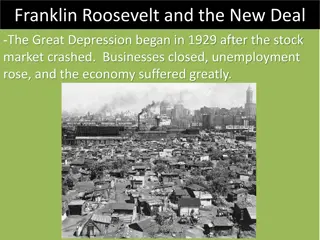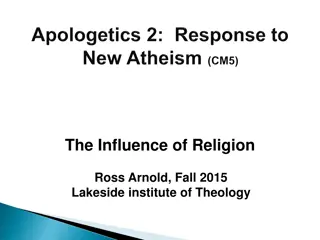Three Mysteries Atheism Cannot Adequately Explain
Delve into the enigmas that challenge atheism's foundation: the beginnings of the universe, life's emergence, and the nature of consciousness. These profound mysteries defy simple explanations, prompting a deep exploration into the essence of existence and consciousness.
Download Presentation

Please find below an Image/Link to download the presentation.
The content on the website is provided AS IS for your information and personal use only. It may not be sold, licensed, or shared on other websites without obtaining consent from the author.If you encounter any issues during the download, it is possible that the publisher has removed the file from their server.
You are allowed to download the files provided on this website for personal or commercial use, subject to the condition that they are used lawfully. All files are the property of their respective owners.
The content on the website is provided AS IS for your information and personal use only. It may not be sold, licensed, or shared on other websites without obtaining consent from the author.
E N D
Presentation Transcript
Three Mysteries Atheism Cannot Adequately Explain How did the universe begin? How did life begin? What is consciousness?
Three Mysteries Atheism Cannot Adequately Explain No philosopher denies that a mystery still attaches to the two great transitions: the origin of the universe itself and the origin of the principle of life itself. Most philosophers have the enlightenment to add that a third mystery attaches to the origin of man himself. In other words, a third bridge was built across a third abyss of the unthinkable when there came into the world what we call reason and what we call will -G.K. Chesterton, The Everlasting Man (pg. 27)
How Did the Universe Begin? An eternal, static universe? Philosophically, the notion of a beginning to the present order of Nature is repugnant I should like to find a genuine loophole. We must allow evolution an infinite time to get started Sir Arthur Eddington (1882-1944)
How Did the Universe Begin? Einstein discovers relativity in the early 20th century
The Big Bang Theory of relativity implies a beginning to time and space Many scientists recognize theistic implications
The Big Bang Confirmed Hubble Space Telescope confirms stages of expansion
Theistic Implications Astronomers who do not draw theistic or deistic conclusions are becoming rare, and even the few dissenters hint that the tide is against them Hugh Ross in The Creator and the Cosmos are becoming rare, and even the few dissenters hint that the tide is against them Hugh Ross in The Creator and the Cosmos Astronomers who do not draw theistic or deistic conclusions
Just Right Universe Fine tuning related to the values of: 1) Gravity 2) Electromagnetic 3) Strong Nuclear Force 4) Weak Nuclear Force
Looking for Loopholes Minority of scientists deny Big Bang Some propose an infinitely expanding and contracting universe Some propose an infinite amount of universes Some look to quantum theory
The Christian Worldview In the beginning, God created the heavens and the earth (Gen. 1:1) By faith we understand that the universe was created by the word of God, so that what is seen was not made out of things that are visible (Heb. 11:3)
The Christian Worldview The heavens declare the glory of God, The sky above proclaims his handiwork (Ps. 19:1) Creation is a platform for God s glory a dazzling theater John Calvin
How Did Life Begin? Time + Chance = Life
How Did Life Begin? Darwin made it possible to be an intellectually fulfilled atheist -Richard Dawkins
DNA Francis Crick and James Watson discover DNA DNA is functional biological information How does functional information arise naturally?
Functional Information Apart from the molecules comprising the gene- expression system and machinery of the cell, sequences or structures exhibiting such specified complexity are not found anywhere in natural - that is, the nonhuman - world... How did these digitally encoded and specifically sequenced instructions in DNA arise? And how did they arise within a channel for transmitting information? Stephen Meyer
Statistical Improbability No current hypothesis comes close to explaining how in the space of a mere 150 million years, the prebiotic environment that existed on planet earth gave rise to life. That is not to say that reasonable hypotheses have been put forward, but their statistical probability of accounting for the development of life still seems remote -Francis Collins
Statistical Improbability At this point the origin of life remains, in light of what is known about the huge size, the extreme specificity, and the exquisite functional precision of the genetic material, a mystery - an event that could not have occurred by chance and to which no significant probability can be assessed on the basis of what we know of the laws of physics and chemistry. -Thomas Nagel
Looking for Loopholes Self Organization? Order from within known causes? Order from without? Computer programs?
More Questions The Cambrian Explosion What accounts for a rapid increase in new biological information? How do novel body forms occur gradually without compromising reproduction or survival?
The Christian Worldview Only known cause of information = Intelligence
The Christian Worldview Let everything that has breath praise the LORD Ps. 150:6
Whats the Nature of Consciousness? Consider, for instance, the problem of the origin and nature of consciousness. The failure to solve it without resorting to religion or quasi-religious "intelligent design" which offers no real resolution since it doesn't explain what created the consciousness behind the intelligence of intelligent design strikes many observers as dangerous. Dangerous because it threatens the foundation of scientific rationalism and materialism. Dangerous because it disrupts one's sense of any order in the universe and opens the floodgates of chaos. -Rod Rosenbaum in Slate
Whats the Nature of Consciousness? What is it? That is, is it made up of the same elementary particles, the quarks that make up the rest of the universe? If not, what sort of material is it? Where does it exist? If it exists in the mind, is the mind contained in the brain? Does the mind differ from the brain? Is it determined by the brain and thus functionally nonindependent? -Rod Rosenbaum in Slate
Whats the Nature of Consciousness? Ultimately, it s solution may evade us for one reason: we re using our limited cognitive abilities to tackle a research project that is hard even to frame we re forced to use an organ that evolved for other reasons to study how that organ makes us feel. -Jerry Coyne, Faith vs. Fact
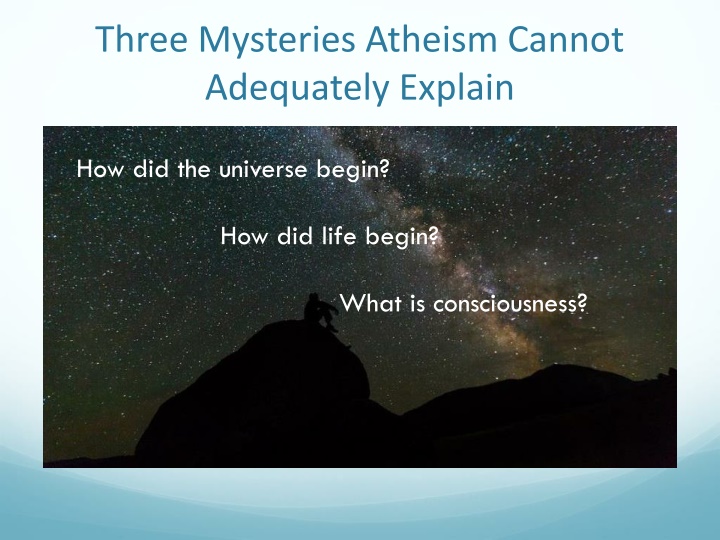

![[PDF] DOWNLOAD READ Diagnosis Solving the Most Baffling Medical Mysterie](/thumb/9855/pdf-download-read-diagnosis-solving-the-most-baffling-medical-mysterie.jpg)





